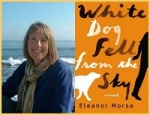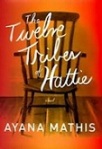
I went to my Fiercely Independent Community Bookstore on Friday evening for a reading by Maine resident Eleanor Morse, author of the recently published White Dog Fell From the Sky. Typically, about 25 to 40 people attend these readings, and most show up at the last minute. The reading at 7pm was to be preceded by a half hour of what was billed as “Zimbabwean music” which could’ve meant anything from a recording to the Maine Marimba Ensemble (none of whom are Zimbabwean but they specialize in traditional and contemporary Zimbabwean music). I figured I’d listen to the music, snuggle into a corner seat out of the way of latecomers, and if the music was canned, I could always, ahem, find something to read.
It didn’t work out that way.
 At 6:32 the main room of the store was jammed. Forget sitting – there was barely room to stand. The instrumentalist and vocalist were indeed playing and singing from the side room. I wandered back and thought I’d snagged a reasonable spot to stand.. but they kept coming, and coming, and coming… I ended up on the steps to the basement. I couldn’t see the table where the speaker would be, or the musicians, or, really, anything other than a wall of people in front of me. I had to leave; I was getting claustrophobic, and I wasn’t going to be able to see or hear anything from where I’d ended up.
At 6:32 the main room of the store was jammed. Forget sitting – there was barely room to stand. The instrumentalist and vocalist were indeed playing and singing from the side room. I wandered back and thought I’d snagged a reasonable spot to stand.. but they kept coming, and coming, and coming… I ended up on the steps to the basement. I couldn’t see the table where the speaker would be, or the musicians, or, really, anything other than a wall of people in front of me. I had to leave; I was getting claustrophobic, and I wasn’t going to be able to see or hear anything from where I’d ended up.
Now, it might sound like I’m complaining, but I’m not – I’m rejoicing! On this Friday night in January, in Maine, at least 100, perhaps 150 people came out to hear a 62-year-old female author talk about her novel set in Botswana during South Africa’s Apartheid. It helped that Oprah listed it as a Must-Read for January 2013. It helped, of course, that she’s a local (she’s from Peak’s Island, and the store owner said the latest ferry had deposited half of the island’s winter residents in time for the event). And I suppose it helped that we’re in our January Thaw and it was well above freezing. But still, the enthusiasm of that attendance, the mellow intensity in that store, more than compensated for any disappointment I felt at missing the talk.
This is good news.
 Skip to Saturday morning, with me working on calculus (yes, I’m taking yet another math course) and half-listening to UP with Chris Hayes, part of the weekend-morning liberal porn block on MSNBC. I could’ve sworn I heard him say George Saunders would be at the table next, which, of course, would be silly; UP features political, economic, and social policy wonks, activists, commentators, and academics, not fiction writers, not even fiction writers known for their anti-consumerism viewpoints.
Skip to Saturday morning, with me working on calculus (yes, I’m taking yet another math course) and half-listening to UP with Chris Hayes, part of the weekend-morning liberal porn block on MSNBC. I could’ve sworn I heard him say George Saunders would be at the table next, which, of course, would be silly; UP features political, economic, and social policy wonks, activists, commentators, and academics, not fiction writers, not even fiction writers known for their anti-consumerism viewpoints.
 But it was indeed George Saunders, whose recently-published collection Tenth of December includes several terrific stories I’ve read from TNY and BASS, like the great title story, the truly astonishing “Semplica Girl Diaries” and the heartbreaking “Home.”
But it was indeed George Saunders, whose recently-published collection Tenth of December includes several terrific stories I’ve read from TNY and BASS, like the great title story, the truly astonishing “Semplica Girl Diaries” and the heartbreaking “Home.”
But it wasn’t just George Sanders. It was also Ayana Mathis, whose The Twelve Tribes of Hattie I started last week. And Victor Lavalle, who I’m not familiar with (but perhaps I should be; The Devil in Silver looks interesting), and Michael Chabon whose name I seem to have been mispronouncing all along.
Four literary fiction writers. On a political commentary show? Yes – discussing President Obama’s political narrative, multiple voices, a foot in two worlds… politics and literary theory collide.
 It’s all available online [addendum; no, it isn’t, just one segment is still available here] in four six-minute segments. Yes, it is political. Yes, everyone there likes Barack Obama. Yes, there are some places they could’ve gone, maybe should’ve gone, but didn’t. But the storytellers are gathered around the Pastry Plate (which is so popular to viewers, it has its own Twitter account with 2000+ followers; no, not me, I have enough trouble following people, let alone carbohydrates) to talk about storytelling, and they do.
It’s all available online [addendum; no, it isn’t, just one segment is still available here] in four six-minute segments. Yes, it is political. Yes, everyone there likes Barack Obama. Yes, there are some places they could’ve gone, maybe should’ve gone, but didn’t. But the storytellers are gathered around the Pastry Plate (which is so popular to viewers, it has its own Twitter account with 2000+ followers; no, not me, I have enough trouble following people, let alone carbohydrates) to talk about storytelling, and they do.
Some highlights:
Section introduction (Chris Hayes):
Perhaps more than any other national political feature in recent memory, Barack Obama has used speeches and big rhetorical set pieces to define his character, tell his story, and propel actual political events….
Given Barack Obama’s remarkable gift in storytelling and the impending second act of the drama of his presidency, we thought it would be enlightening to invite some genuine experts in storytelling to give their thoughts on the narrative President Obama is creating.
George Saunders:
What he’s really doing is saying to the listener, ‘I trust you deeply. I’m going to be as honest as I can, I’m going to tell you the weirdest marginal truths, and because you’re as smart as I am, you’re going to lean forward.’ In fiction that’s an important principle, to assume the best of your reader, don’t puppeteer, don’t condescend.
Ayana Mathis:
It is this question of creating a narrative of yourself… and it is a combination of public perception and his own perception of himself.
Victor Lavalle:
People who are drawn to fiction are asking the writer, “Do a good enough job to help me become invested in someone else for a time, so I can see our common humanity, our common pain, our common everything, and maybe come out of here with the sense that I’m not the only one feeling this loneliness, this sadness…” that’s part of the pact of writing fiction vs nonfiction.
Chris reads a quote from the January 2010 Junot Diaz TNY essay, which may have inspired this whole angle; even Flannery Connor gets a quick mention as an aside.
Then there’s the usual closer of the show, “Now We Know,” a report of something each guest has learned this week. Mathis talks about her discovery of the use of a blossoming pear tree in two disparate works, Saunders comments on the value of humor thanks to some galley proofs he read, Lavalle bemoans the poor quality of bootleg DVDs, and Chabon worries about this giant thing scientists just discovered floating around out there in the universe, a cluster of quasars so huge it can’t possibly exist. It was the most fun Now We Know segment in a long time. That’s what happens when you talk to writers.
Two public displays of affection for books and writers: What a great start to the weekend.

Pingback: Pushcart 2013: Marilynne Robinson: “On ‘Beauty’” (non-fiction) from Tin House #50, Winter 2011 | A Just Recompense
Pingback: Pushcart 2013: Marilynne Robinson: “On ‘Beauty’” (non-fiction) from Tin House #50, Winter 2011 | A Just Recompense